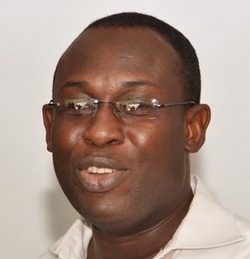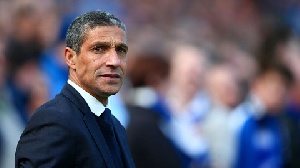- Home - News
- TWI News | TV
- Polls
- Year In Review
- News Archive
- Crime & Punishment
- Politics
- Regional
- Editorial
- Health
- Ghanaians Abroad
- Tabloid
- Africa
- Religion
- Election 2020
- Coronavirus
- News Videos | TV
- Photo Archives
- News Headlines
- Press Release
General News of Wednesday, 21 November 2012
Source: radioxyzonline.com
Candidates on IEA Debate must be reduced to two - Imani Ghana

Mr. Kofi Bentil, Vice President of policy think-tank Imani Ghana, has admonished the Institute of Economic Affairs (IEA) to reduce the number of candidates who participate in its presidential debates to two in order to have the most efficacious discussion.
“Some very tough decisions have to be made so that we can improve it. For instance, I don’t think we will have a good debate for as long as we have four people on the podium. So we have to find a way of maybe reduce it to two people. It’s a tough decision but for me I think that is the kind of decision that has to be made,” Mr. Bentil said.
Mr. Bentil made this proposition in an interview with Emefa Apawu on Breakfast XYZ Wednesday morning.
The policy analyst said the argument that all other presidential candidates must be given the same platform to put out their policies is bereft of a logical basis.
According to him, “The people who are asking for everybody to be there are simply asking us to have an exercise in futility. How do you have six people debating? Nobody is going to benefit from it. So I am saying the IEA should be bolder. If they are going to take flak for doing four, they might as well just do two and take the flak for that.
“If you ask anybody, they will tell you who are the two front-runners and I think we’ll have a better quality debate between the front-runners,” he added.
Mr. Bentil indicated that aside the number of candidates, it is essential to examine the mode of engagement, stressing that what currently takes place is a question and answer session that cannot be called a debate.
“A debate is more than just a question and answer session. I thing that going forward, one of the ways to improve the debate will be to reduce the number to two.”
He however commended the IEA for excelling in organizing such programmes in the past, saying “the IEA has received a lot of flak but the IEA has done what nobody has done; so they deserve a lot of commendation.”
The IEA, according to Mr. Bentil, should not set out to please anyone in their operations, adding that if they need to take the most unpopular but realistic decisions, then so be it.
On the impact of the debates on the electorates, Mr. Bentil posited that the debate may not change the mindset of many people but it still has some kind of effect on the middle and upper classes.
“The debate may not be the election winner but anyone who says the debate does not have an effect is not being accurate… Those debates are very, very important and we must continue to improve on that tradition,” he counseled.










